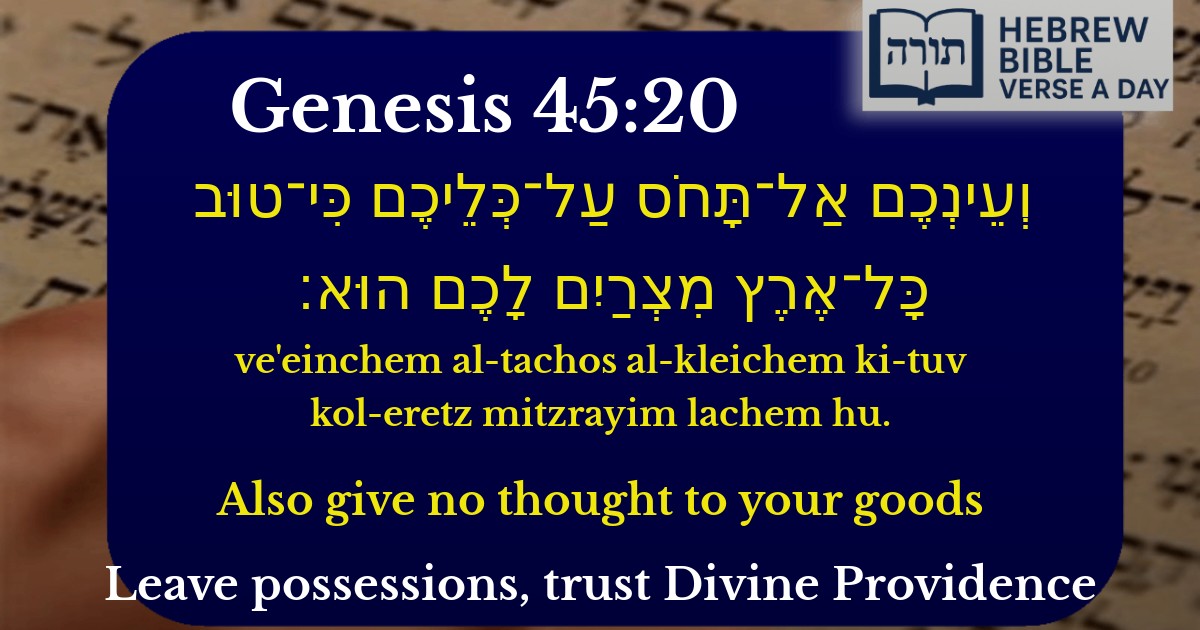Frequently Asked Questions
Q: What does Genesis 45:20 mean when it says 'give no thought to your goods'?
A: This verse is part of Pharaoh's message to Yosef's (Joseph's) family, inviting them to settle in Egypt during the famine. Rashi explains that Pharaoh was reassuring them not to worry about leaving their possessions behind in Canaan, because Egypt would provide them with everything they needed. The phrase 'give no thought to your goods' means they shouldn't be concerned about material possessions, as greater blessings awaited them in Egypt.
Q: Why is Genesis 45:20 important in the story of Yosef and his brothers?
A: This verse marks a turning point where Pharaoh himself invites Yaakov's (Jacob's) family to Egypt, showing how Yosef's rise to power benefited his entire family. The Midrash teaches that this was part of Hashem's plan to fulfill the prophecy given to Avraham (Abraham) that his descendants would be strangers in a land not their own (Genesis 15:13). The invitation to Egypt with all provisions set the stage for the eventual Exodus.
Q: What lesson can we learn from Genesis 45:20 about trusting in Hashem?
A: The verse teaches us about bitachon (trust in Hashem). Just as Yosef's family was told not to worry about their possessions because better things awaited them, we learn that sometimes we must let go of what we have to receive greater blessings. The Rambam teaches that true trust in Hashem means recognizing that whatever happens is ultimately for our good, even if we don't understand it at the time.
Q: How does Genesis 45:20 relate to the concept of hospitality in Judaism?
A: This verse demonstrates the Jewish value of hachnasat orchim (welcoming guests). Pharaoh's offer to provide for Yosef's family reflects the Torah ideal of generously hosting others. The Talmud (Shabbat 127a) teaches that hospitality is greater than receiving the Divine Presence, showing how central this mitzvah is in Jewish tradition. Pharaoh's actions, though he wasn't Jewish, set an example of proper treatment of guests.
Q: Why does Pharaoh say 'the best of all the land of Egypt is yours' in Genesis 45:20?
A: Rashi explains that Pharaoh was offering them the fertile region of Goshen (Tzofnat Pa'aneach), the best land for shepherds. The Talmud (Sotah 11a) notes that this was part of Hashem's kindness - even in exile, the Jewish people were given the best conditions. This shows that Hashem prepares the remedy before the affliction, a concept known in Jewish thought as 'refuah lifnei hamakah'.


Context of the Verse
The verse (Bereshit 45:20) appears in the narrative where Yosef reveals his identity to his brothers and instructs them to bring their father Yaakov down to Egypt. Pharaoh, upon hearing the news, commands Yosef to tell his brothers not to concern themselves with their possessions, as the best of Egypt will be theirs.
Rashi's Explanation
Rashi explains that Pharaoh was reassuring Yosef's brothers that they need not worry about leaving behind their possessions in Canaan, as they would receive the finest of Egypt. Rashi emphasizes that Pharaoh's words were meant to alleviate their anxiety about material loss, assuring them of Egypt's abundance.
Rambam's Perspective
Rambam (Hilchot De'ot 5:10) discusses the ethical implications of this verse, noting that Pharaoh's offer reflects the principle of hachnasat orchim (hospitality). The verse demonstrates how a host should provide generously for guests, ensuring they lack nothing and feel secure in their new environment.
Midrashic Insights
Chassidic Interpretation
The Sefat Emet (Vayigash 5632) teaches that Pharaoh's words hint at a spiritual lesson: when one embarks on a journey for a higher purpose (like Yaakov's descent to Egypt), material concerns should not hold them back, as Divine providence will provide all necessities.
Halachic Application
The Shulchan Aruch (Orach Chaim 248:4) cites this verse as a source for the principle that one should not refrain from proper expenditures for mitzvah purposes, as Hashem will provide the means to fulfill commandments properly.